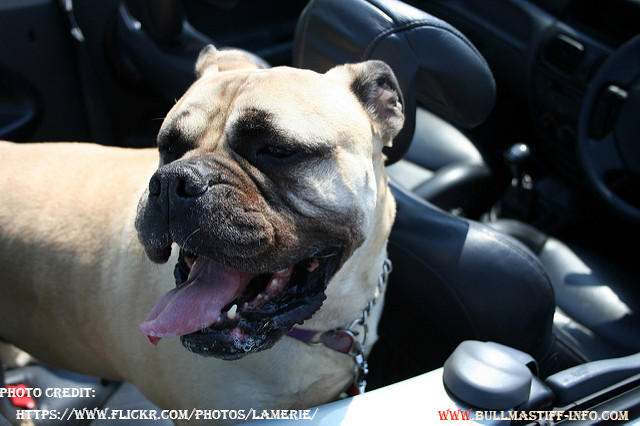Contents
Are you looking for a pet that does not merely make your time amazing but also protects you quite well? If yes then stop exploring anymore.
The bullmastiff is the one that has the ability to guard its owner. This hybrid dog was produced by the breeding of Bulldog and Mastiff dogs.
It comprises of qualities of both of these breeds. Bullmastiff dog colitis is the inflammation of the colon. Bullmastiff has a genetic predisposition for several diseases.
It is necessary to give extra care and love to your pet in order to avoid many disorders that may lessen the quality of your dog’s life.
These include Bullmastiff dog allergies, hip dysplasia in Bullmastiff dogs, cancers such as lymphoma, hemangiosarcoma, stomach disorders such as bloating, flatulence, Bullmastiff dogs colitis, etc.
The average lifespan of these guard dogs is 8 to 10 years. Enhancing the lifespan is seen when the owners ensure to provide the best health to their dogs.
What Is Colitis in bullmastiff dog?
Are you curious to know what is colitis in Bullmastiff dogs? Stop exploring anymore! Here, I am going to guide you about this disease. Bullmastiff dog colitis is characterized by the inflammation of part of the intestine, named the colon.

The large intestine contains the colon which gets inflamed and leads to complications. Bullmastiff dog colitis is quite painful and hard to ensure.
Bullmastiff dog contains three acceptable coat colors viz fawn, brindle, or red. The red Bullmastiff dog contains the coat hair of dull red to bright rich red color.
The fawn Bullmastiff dog contains the coat color of dull brown to bright brown color. Likewise, the brindle Bullmastiff dog contains the strips overlay of both color fawn and red.
What Are Symptoms Of Colitis In bullmastiff Dogs?
Let us have a glance at are symptoms of colitis in Bullmastiff dogs. This knowledge of symptoms should be known in order to treat the dog at an earlier stage of its life. These include:
- Vomiting
- Diarrhea
- Weight loss
- Pain in defecation
- Flatulence
- Dehydration
- Loss of appetite
Diarrhea is the most common symptom that indicates inflammation. In many cases, colitis becomes complicated and diarrhea is accompanied by blood or mucus. Recognize the symptoms by keen observation.
Although whipworms are one of the most common and popular reasons of colitis yet it is quite hard to diagnose.
Staw and garbage are substances that contain indigestible fibers. Sometimes, diarrhea can be due to other reasons such as a side effect of other diseases.
The Causes of Colitis in bullmastiff Dogs:
Causes are the risk factors that can lead to disease. Controlling or eliminating these risk factors is beneficial as it prevents the disease. The causes of colitis in Bullmastiff dogs are given as below:
- Bacterial infection
- Food allergy
- Consuming excess grass
- Parasites
- Severe anxiety
- Whipworms
- Fungal infection
- Caner of tumor
- Consuming garbage
- Inflammatory bowel disease (IBD)
- Spoiled food
Try to reduce or eliminate the exposure of your pet to these risk factors. Majority of the bullmastiff dog suffer from colitis in their life. It can be acute colitis or chronic colitis. Acute colitis is most common in older dogs.
Focusing on the diet and controlling the stress through training can aid in treating acute colitis. Bullmastiff dog colitis can be chronic colitis that is highly difficult to treat.
It usually lasts for more than 2 days. Bacterial infection due to salmonella causes colitis. Avoid the dog from consuming the garbage. Keep a close eye on your pet in order to ensure that he is enjoying a healthy diet and is not consuming dirty or filthy matter.
While walking in the garden, ensure that your dog stays away from eating the grass. Food intolerance is mainly from dyes, preservatives, proteins, and contaminants.
Allergens also contribute to Bullmastiff dog colitis. Watery and bloody stools lead to dehydration, lethargy, and weakness.
Treating Colitis in bullmastiff Dogs:
If diarrhea is being observed for more than 2 days then consider treatment of the dog. Consult a vet when the symptoms of a disease are seen in your dog.
He will examine and diagnose the dog with a physical examination and some simple tests such as feces examination.
Treating colitis in Bullmastiff dogs can improve their quality of life. In some cases, the dog requires lifelong medications.

Although, it sounds quite tough to administer medication for a much longer duration of time yet it is necessary to prevent recurrent colitis.
Treating colitis in Bullmastiff dogs is entirely dependent on the symptoms and diagnosis. The diet is of key concern in treating colitis.
Dietary changes and antibiotics can lead to a prognosis from colitis. Bullmastiff dog does not require a lot of effort for cleanliness.
Use a good quality shampoo for bathing purposes. Sometimes the dog may suffer colitis because of stress. Hence, it is necessary to figure out that what is the basic reason behind the colitis.
Try to spend time with your dog in order to reduce its stress. Lifestyle modification plays a key role in the maintenance of good health.
For the long-term treatment of Bullmastiff dog colitis, a powerful weapon named prednisone is being used. Eliminate the diet that contains allergens, contaminants, and chemicals.

Metronidazole and sulfasalazine can be given to the dogs for the management of the disease. Feed the dog on such a diet that does not contain chemicals or may contain the least chemicals.
Using food that contains chemicals is simply a great risk for the life of a Bullmastiff dog. Bullmastiffs should be covered properly in chill and cold weather as they catch a cold easily.
Provide warm food to your Bullmastiff dog in such a season. Place the dog house near a warm place.
Likewise, in the hot weather, consider special precautions and care for your beloved dog. Prevent colitis by using plenty of water and taking a high fiber diet.
you might be interested to read : Bullmastiff dog Cardiomyopathy
